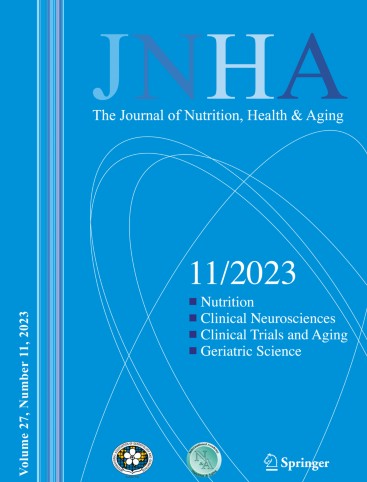Patterns of time spent in sedentary behavior, physical activity, and sleep are associated with cognitive decline among CLSA participants: A latent class analysis
IF 4.3
3区 医学
Q1 GERIATRICS & GERONTOLOGY
引用次数: 0
Abstract
Objectives
To identify latent classes of time spent in movement activities (leisure sitting, physical activities, and sleep), characterize them, and assess their association with changes in memory, executive functioning, and overall cognition among middle aged and older adults.
Design
Longitudinal cohort study with a 3-year follow-up.
Setting
Non-institutionalized middle aged and older adults from the general population.
Participants
12,212 adults aged 45–86 years from the Canadian Longitudinal Study on Aging.
Measurements
Latent Class Analysis was performed to identify groups of participants with comparable movement activities based on self-reported time spent in leisure sitting, walking, moderate and vigorous physical activity (assessed using the Physical Activity Scale for the Elderly), and sleep at baseline. Multivariable linear regression models were used to examine the associations between the identified groups and reliable change in memory, executive functioning and overall cognition, measured by a validated neuropsychological battery including 6 different cognitive tests.
Results
Three groups were identified: Sedentary/Disturbed Sleep (SedDS, 53.9%), Intermediately Active/Normal Sleep (IntNS, 34.6%), and Active/Normal Sleep (ActNS, 11.5%). The SedDS group showed greater cognitive decline after 3 year follow-up across all cognitive domains (memory β = −0.061, 95%CI −0.100, −0.021; executive functioning β = −0.049, 95%CI −0.090, −0.008; overall cognition β = −0.067, 95%CI −0.106, −0.027) compared to IntNS. Interestingly, ActNS showed a greater cognitive decline (memory β = −0.065, 95% CI −0.124, −0.005; overall cognition β = −0.062, 95% CI −0.123, −0.002) relative to IntNS.
Conclusion
In mid- and later life, sleep disturbances primarily coincide with a sedentary lifestyle. For optimal cognitive ageing, moderate physical activity seems more beneficial than either sedentary behavior or excessive physical activity to delay accelerated cognitive ageing.
久坐行为、体力活动和睡眠的时间模式与里昂证券参与者的认知能力下降有关:一项潜在类别分析
目的确定运动活动的潜在时间类别(休闲坐着、体育活动和睡眠),描述其特征,并评估其与中老年人记忆、执行功能和整体认知变化的关系。设计纵向队列研究,随访3年。从一般人群中选出非机构的中老年人。参与者来自加拿大老龄化纵向研究的12212名年龄在45-86岁之间的成年人。测量方法:根据自我报告的休闲坐着、步行、中度和剧烈体育活动(使用老年人体育活动量表进行评估)和基线睡眠时间,进行潜在类别分析,以确定具有可比运动活动的参与者组。使用多变量线性回归模型来检查确定的组与记忆、执行功能和整体认知的可靠变化之间的关系,通过包括6种不同认知测试的有效神经心理学电池来测量。结果分为3组:久坐/不安睡眠(SedDS, 53.9%)、中度活跃/正常睡眠(IntNS, 34.6%)和活跃/正常睡眠(ActNS, 11.5%)。随访3年后,SedDS组在所有认知领域均表现出更大的认知衰退(记忆β = - 0.061, 95%CI = - 0.100, - 0.021;执行功能β = - 0.049, 95%CI = - 0.090, - 0.008;总体认知β =−0.067,95%CI−0.106,−0.027)。有趣的是,ActNS组表现出更大的认知衰退(记忆β = - 0.065, 95% CI = - 0.124, - 0.005;总体认知β = - 0.062, 95% CI - 0.123, - 0.002)。结论:在中年和晚年,睡眠障碍主要与久坐的生活方式有关。对于最佳的认知衰老,适度的体育活动似乎比久坐或过度的体育活动更有利于延缓加速的认知衰老。
本文章由计算机程序翻译,如有差异,请以英文原文为准。
求助全文
约1分钟内获得全文
求助全文
来源期刊
CiteScore
7.80
自引率
3.40%
发文量
136
审稿时长
4-8 weeks
期刊介绍:
There is increasing scientific and clinical interest in the interactions of nutrition and health as part of the aging process. This interest is due to the important role that nutrition plays throughout the life span. This role affects the growth and development of the body during childhood, affects the risk of acute and chronic diseases, the maintenance of physiological processes and the biological process of aging. A major aim of "The Journal of Nutrition, Health & Aging" is to contribute to the improvement of knowledge regarding the relationships between nutrition and the aging process from birth to old age.

 求助内容:
求助内容: 应助结果提醒方式:
应助结果提醒方式:


